Like much of America, we had a blast of winter during February.
Before the winter blast, we took advantage of freezing temperatures to move the enormous box truck up the barn driveway (there are separate driveways leading to the house and the barn). This is the separate driveway, if you recall, where we got the U-Haul stuck in the mud when we first moved in. It is still an impassible morass of mud, which is why we had to wait until the temperatures froze it solid to get the truck up there. (We'll get some gravel on it when spring comes.) Prior to this, the box truck was in the house driveway. Now the truck is in a more convenient location to unload it when the weather cooperates.
The snow moved in. Gradually our car disappeared.
We learned there are lots of guys living in the neighborhood who use a snowfall as an excuse to bring out their heavy equipment. Since we're temporarily without our own heavy equipment (the tractor is still at our old place), we were grateful. Don went out to thank this fellow for clearing a portion of our driveway.Clearly he spun around quite a bit, trying to get traction, before abandoning the truck and walking home.
Later we saw him try again to drive uphill, but after sliding sideways downhill, he gave up, backed the truck to the base of his driveway, and waited for better conditions.
Unlike at our old place, we have to make adaptations for handling winter here. That's because – we learned – snow usually equals power outages.
Water isn't a problem. We have enough stored for several days of careful use.
Lights aren't a problem. We have plenty of lamps and kerosene.
The problem is heat. As the folks in Texas brutally learned, electric heat sources are terrible things to depend on, yet that's all we have in our new home (pellet stove and forced-air heating), at least for the time being. Our brand-new wood cookstove still sits in the barn at our old home, and boy howdy we can't wait to get it installed.
But after the first power outage of the winter, we had to scramble to stay warm. Fortunately Don had purchased a Mr. Heater portable Big Buddy propane heater, suitable for indoor use. He got it several months ago for emergency use in our temporary rental home. We never needed it there, but we were sure glad we had it here.
He hooked it to a propane tank. Had we required it (and we didn't), this tank would have lasted about 20 hours at the lowest setting. We had another tank on standby.
I won't say this little heater kept the house spectacularly warm – we topped out at 60F – but it was certainly better than nothing. It's only rated to heat about 490 square feet, so it had its limitations.
We parked the bird cage right in front of the heater to keep Lihn as comfortable as possible.
In this case, the power wasn't out for more than 12 hours, so we were fine. We even got a bit of sunshine, which was a nice change, though it didn't do much to heat up the cold weather.
This is the challenge here in our new home: Finding reliable, low-tech, non-electric sources for the necessities of heat and water. We'll document how we tackle these things as time goes by. Stay tuned.
Update: A reader left a comment as follows: "Hi Patrice, I appreciate your blog and have been a reader for years. I live in Western Oregon and have some (not enough) preps in place. So when the recent ice storm was forecast here I was feeling a little smug and unconcerned. However I was away for about 10 days in another state helping a family member when the storm came and the power went out. My adult daughter was home. I had advised her to fill the bathtub with water and get some containers of drinking water together which she disregarded. We have a wood stove and stored food and several oil lamps so I thought we would be ok for a few days. It turned into 6 days. When we finally came home it was to a cold, damp house and no water and were still without power. My hubs and I rallied and went to a friend's house and got about 10 gallons of water to get us through the night and fired up the wood stove and began collecting rain water in a stock tank we keep around specific to the purpose. (rain is a fair bet around here) We are able to cook on the woodstove and have a campstove that we pulled out. MY failures were many and we are beginning to think of how to address them but in the short term not having adequate lighting was tough. I have several oil lamps but they are so dim I felt nervous getting them close enough to read by worried I might accidentally knock them over. I know you've gone over this before but I couldn't find the info. Would you consider summarizing your experiences with grid down lighting please and thank you? Soggy in Salem"
I don't claim to be an expert in grid-down lighting, but for what it's worth, here's my two cents.
I happen to love kerosene lamps. They're our go-to option when the lights go out. However "Soggy in Salem" is correct – they're very dim. In pre-electric days, people just accepted the fact that most lighting options were dim, and that was that. But people have gotten used to brighter illumination, which brings challenges in grid-down situations.
A brighter alternative to kerosene lamps is Aladdin lamps, which are essentially kerosene lamps with a mantle (similar to Coleman camp lantern which also use mantles). These put out a tremendous amount of light – something on the order of 60 watts for each lamp. The downside is they're on the pricey side, and mantles can be fussy. Aladdins used to be available nearly everywhere – I remember buying our lamps at a local hardware store back in 1998 or so – but my understanding is the only remaining distributor is Lehman's in Ohio. They not only have a small in-store museum dedicated to Aladdins, but they have every possible permutation of the lamps, along with every possible replacement part.
Nowadays, there are all sorts of battery, solar, and LED lights available on the market. My recommendation is to contact the customer support personnel at Lehman's, which has a massive off-grid lighting department, and discuss alternatives with them. Their sales staff is trained and knowledgeable, and I can't imagine a better resource anywhere in the country who could offer better advice.


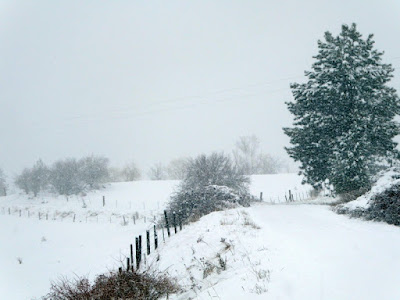
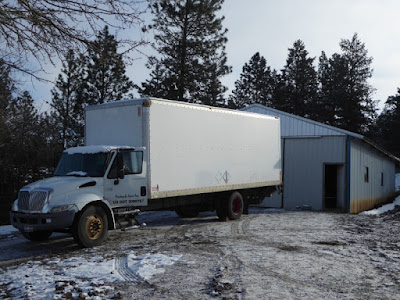

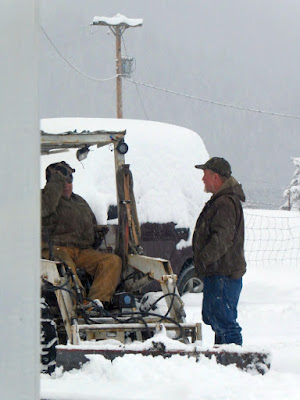



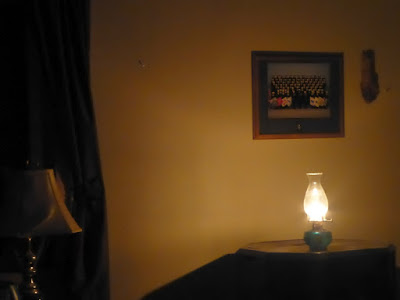
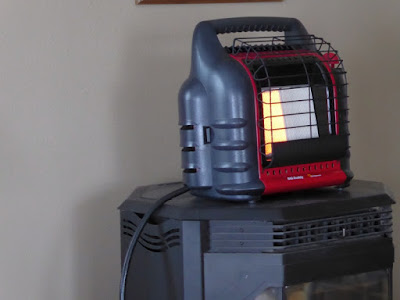
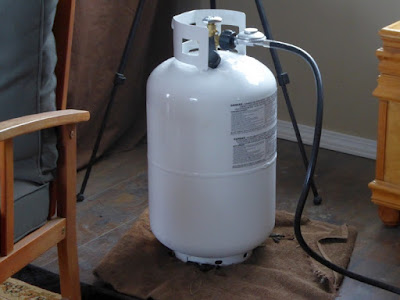
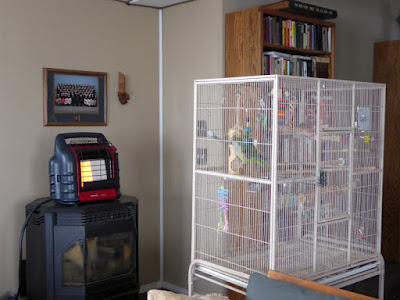

We just went through the rolling blackouts here in Texas. I had filled a number of containers with water but they did not last long. I had some bottled water but several cases had been sitting in a uncooled garage for a number of years and was not comfortable drinking them. I finally asked my neighbor for some and he brought a case which got us through. We melted snow to flush the stools and discovered that it takes a LOT of snow to make much water. We were on a 1/2hr on 1/2hr off schedule and so was our small water co's well so we were out of water for 3 days. We had food and heat but the water was the big thing. I had 18 gal of water stored but when I was down with a broken hip someone dumped them out and while I knew that I never refilled them. Dumb!
ReplyDeleteDon't be fooled that bottled drinking water has to be cooled for it to be ok. That water get shipped in the heat of August, thru the desert where temps reach over 120°. Sometimes they sit there for weeks waiting to be delivered. My hubby is a retired truck driver and laughed when I told him this myth. They made that up so the public would not store it but buy it so the companys would make more money.
DeleteWe just went through the rolling blackouts here in Texas. I had filled a number of containers with water but they did not last long. I had some bottled water but several cases had been sitting in a uncooled garage for a number of years and was not comfortable drinking them. I finally asked my neighbor for some and he brought a case which got us through. We melted snow to flush the stools and discovered that it takes a LOT of snow to make much water. We were on a 1/2hr on 1/2hr off schedule and so was our small water co's well so we were out of water for 3 days. We had food and heat but the water was the big thing. I had 18 gal of water stored but when I was down with a broken hip someone dumped them out and while I knew that I never refilled them. Dumb!
ReplyDeleteWe love the Luci solar inflatable lanterns. A search will bring them up online. They put out a ton of light, hold a charge forever, and charge easily and quickly. We haven't had to use them for extended power outages (just short ones) but we use them on family camping trips and my husband and kids take them when they go backpacking.
ReplyDeleteOne on each end of a picnic table is enough light to play games and read. When they are backpacking they just clip them to the outside of their pack and it charges while they hike. We have multiple that have survived through several years and multiple 10 or more day hikes as well as just normal car camping trips. I put them away fully charged and they are still fully charged when I pull them out for the next use.
We use the Luci lights, too. They are great.
DeleteLED lights are becoming more and more accessible and inexpensive. Course, cheap is as cheap does. BUT, I've found that even the cheap ones are remarkably tolerant of sitting around unused and still perform very nicely when turned on the few times a year we use them. And when I say the cheap ones, I mean less than $10 for the vaguely lantern shaped LED light. They usually take AA or AAA batteries, which are purchasable in bulk bricks at many box stores, and because they use so little power those batteries last a LONG time. Two or three of those little LED lanterns do a beautiful job at lighting my house enough to comfortably read.
ReplyDeleteI used to prefer kerosene, but with the addition of not only two cats to the house, but a large dog with a fluffy tail right at table height made me worry about tails and flames. The LED lights have worked wonderfully for years.
When we lived in rural IN we were having power outages and to solve this problem we bought a generator. The power company then trimmed the trees along the powerlines and no more problems. Just the way it goes sometimes. But, why not a generator if you know outages will be a problem. They run on gas and that can be a storage problem. They also run on propane which is less of a storage problem. BUT, they can also run on SMOKE. The process is called "wood gasification". There are examples on U-Tube of people running their automobiles by burning wood to create the smoke which gets channeled to the carburetor to run the engine.
ReplyDeleteLike you, we are now at the mercy of the grid. Recent events have me concerned with your very scenario. We too have a buddy heater, but it wouldn't take long to burn through that source. I have a "renewed" mission to remedy this as best as possible until we get to our permanent residence.
ReplyDeleteDo ya ever wish you hadn't left your last home? I would give a kidney to have been able to buy your old place one.
ReplyDeleteNo regrets, at least not yet. Half the reason we moved was for the "Adventure." We look forward to bringing our new place up to the same level of self-sufficiency as our old place. It's also nice to know the new owners of our old home are of the same independent DIY mindset.
Delete- Patrice
We recently moved to a rural town in a cold corner of Washington State, and weathering unexpected power outages was one of our top concerns. I'm just old school and feel most comfortable with multiple options for heat, light, water, etc. We rarely use electric heat, so we were delighted to find a house with a high efficiency fireplace insert that capably heats our home. While friends and family have dealt with freezing houses during power outages, we've been toasty warm. This summer we'll put in the sweat equity to cut several cords of wood. It's a lot of work, but knowing we aren't going to be cold makes the effort so worthwhile!
ReplyDeleteI recently ran across a heater made by "Pro-Com." These are either stand-alone or wall-mountable, and are meant for indoor, unvented use. The first one I bought was on Craigslist, and was slated for my outbuilding ham shack. I liked it so much, I bought another for the garage on Amazon. They have tip-over protection, as well as CO/low O2 shutoffs. I don't remember the BTU output of the Craigslist buy, but the second unit is a 20K BTU unit. They'll run on either propane or natural gas. I'm not sure why, but the instructions for both units specify a 100 lb or greater propane tank. I use a 20 lb tank on the ham shack unit, and a 40 lb tank in the garage. I haven't had any issues with either one. I also have a couple of kerosene heaters which work GREAT inside the house! The kero heaters pop up at yard sales CHEAP. Of course, NOW they'll go for their weight in gold...
ReplyDeleteAs for lighting, I have Coleman, kerosene, and LED options. That being said, IF you can afford to buy and store a generator, I would recommend doing so. Lighting can be handled off-grid. Refrigeration and cooking, nots'much. Even if you have a gas stove; yes, you can light the burners with a match. Most modern stoves use electronic thermostats for the ovens though, so without electricity, that is down for the count.
Don't forget your car. Hook up a small inverter and start the engine, and you essentially have a small inverter generator for things like the aforementioned gas stove electronics, charging computers and phones, and the like. ...another reason to keep your car's tank full...
https://www.nokero.com/
ReplyDeleteA friend was selling these a few years back so we bought a few. They've since deteriorated since they're plastic and we hang them permanently in the window but when we first got them we were amazed at how bright they are. We should buy more. They were developed for third-world countries but do an amazing job here, too.
Lesson learned from 2013 freeze.
ReplyDeleteDon't use water from melted snow to flush.
Instead, put a wash tub on the shower floor.
Take a 'sailor's shower' with water heated on the woodstove.
Then take your dirty shower water in the tub to flush since Mr. #2 don't care if the water's dirty.
Our home in north central Idaho is heated with a free standing vented propane stove with a glass door. When the power is out, the fan runs on battery power,automatically. For light, we use solar led lamps. Kerosene fumes irritate my lungs and unvented propane bothers me, too. I really loved our wood stove where we lived in Oregon. Mmmmmm
ReplyDeleteWick width matters for lamp brightness for the non-mantle lamps. I have two: a 7/8" lantern and a double-wick lamp that Lehman's has sold in the past, but I don't see it there now: I assume they sold out last year in the panic. Each wick is 1 1/8" wide, so it's very bright (and also very hot and comparatively fuel inefficient).
ReplyDeleteThe lantern is noticeably dimmer, but I can still read by its light comfortably. For both, I do have the light close, but it's when I'm sitting at the dining room table and the light source is about a foot away. That seems relatively stable. It is true that these wouldn't work for reading if they were across the room.
ReplyDeleteEspañol
Inglés
Siempre me he preguntado porque en estados unidos, ante un corte de la energia electrica se quedan sin agua?. No seria conveniente tener un deposito de agua en el tejado o una estructura paralela, como lo tenian las bombas accionadas por el viento utilizadas en las antiguas granjas?. Esto lo escribo desde la total ignorancia pues nunca he visitado USA
I have always wondered why in the United States, when there is a power outage, they run out of water? Would it not be convenient to have a water tank on the roof or a parallel structure, as had the wind-driven pumps used in the old farms? This I write from total ignorance because I have never visited the USA
A fairly complicated history involving late development, disease and control.
Deletehttps://en.wikipedia.org/wiki/Drinking_water_supply_and_sanitation_in_the_United_States
If you're on city water you likely won't run out of water in a power outage. However in rural areas my places have an electrical pump that pumps water from the well into the house. Alternatives exist, but for various reasons they're not standard.
DeleteI'd really like to know where you got those water jugs with the wide mouths and handles. Looks great for water storage in my kitchen rather than the five gallon buckets. Thanks.
ReplyDeleteThey're one-gallon mayo jugs I get either at Costco or Cash'n'Carry (Smart Food Services). I've been saving them for years. They have a million uses. Sadly they seem to be moving away from the style with handles to a style without.
Delete- Patrice
ReplyDeleteEspañol
Inglés
Me llaman la atención que cada vez que falla la energia electrica , se corta el suministro de agua, ya que ese ed el talon de aquiles, no seria conveniente disponer de un deposito en altura que provea de agua por medio de la gravedad.
I am struck by the fact that every time the electrical power fails, the water supply is cut off, since that is the Achilles heel, it would not be convenient to have a tank in height that provides water through gravity.
When I was a child the lake cabin had a set up like that, but it was not a winterized cabin. Patrice's place has the same issue - ice will not gravity feed to a faucet.
DeleteSome people do have that option. However, other folks live where city ordinances do not allow that. If you are talking about storing rain water, there are also places that have laws against that as well.
DeleteOne would hope that events like these recent ones - even for folks who did not live through them - would cause us to give greater thought to preprations.
ReplyDeleteThe Amish near us run some VERY bright led lights powered by Dewalt tool 20v batteries. They charge them from relatively small solar panels. Although we now have a larger solar system at our off grid cabin- we started with an inexpensive ‘all in 1’ kit from Harbor Freight. It even came with 2 led lights. We still use that small system in our garage to keep a 12v solar battery charged for emergencies. As for our lanterns- I cannot stand the smell of kerosene. So while it’s pricier- I buy the paraffin lamp oil. Some odor- but nothing like kerosene. Our well pump is powered by our solar system with a generator back up if needed (ie: snow on panels or cloudy days). We are very conservative with our solar to preserve the batteries for longer use. We feel very blessed to have been able to put these resources together in case of an emergency.
ReplyDeleteMuch as I love the old ways I light my off-grid cottage with LEDs and to a lesser extent tealight. Even a $10 or $20 headtorch powered by AA or AAA batteries will last for weeks of typical use on a single set of batteries.
ReplyDeleteFor lights we use propane. They are made by serval companies. Paulin and Humphrey are the most common. One of the only issues is they throw off a lot of heat for summertime use. Some are actually called "Mr. Heater". If you have propane I suggest getting a few. They are simply awesome.
ReplyDeleteI'm a practical constitutional conservative stay-at-home gun-toting homeschooling cow-milking rural-living Christian mom.
ReplyDeleteYou're also very very stupid.
Please, oh wise one, share your wisdom with us. Show us how you are so much smarter than someone else. Pretty please.
DeleteI seem to recall Enola stating that she favored the Coleman mantle lamps over Aladdin, I believe for ease of use.
ReplyDeleteI can't say much; we've been lucky so far. It's been so many years since our power was out for long that, last time, we were broke just-out-of-college kids getting by with candles...